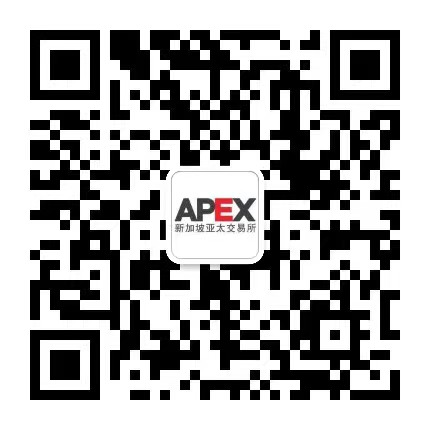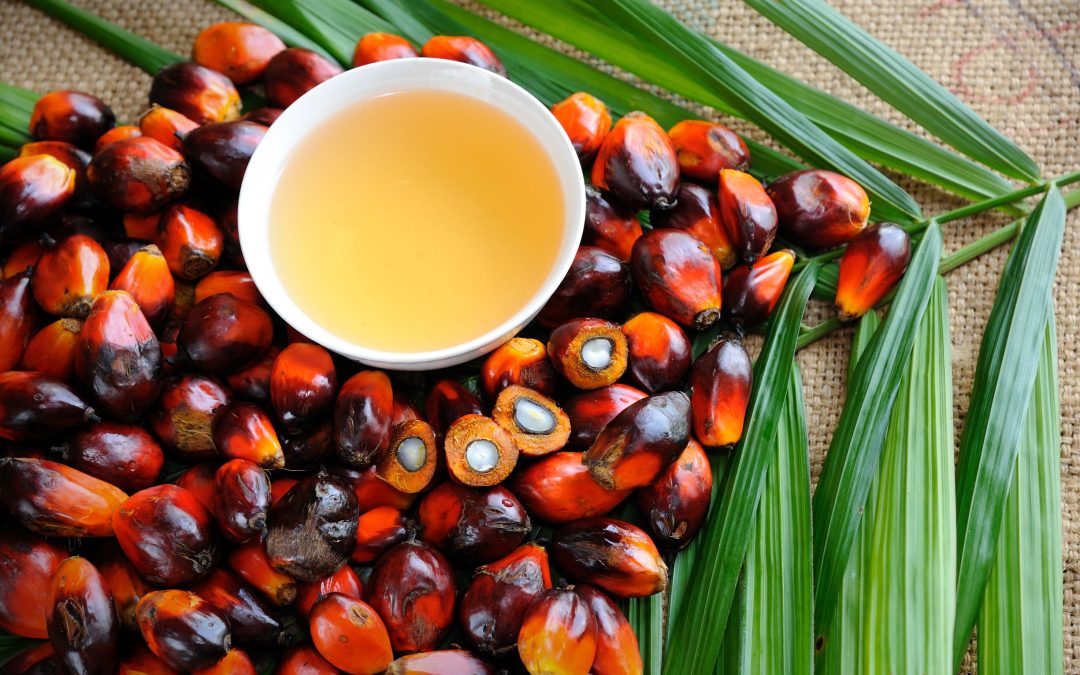
by APEX News | 2020-08-26
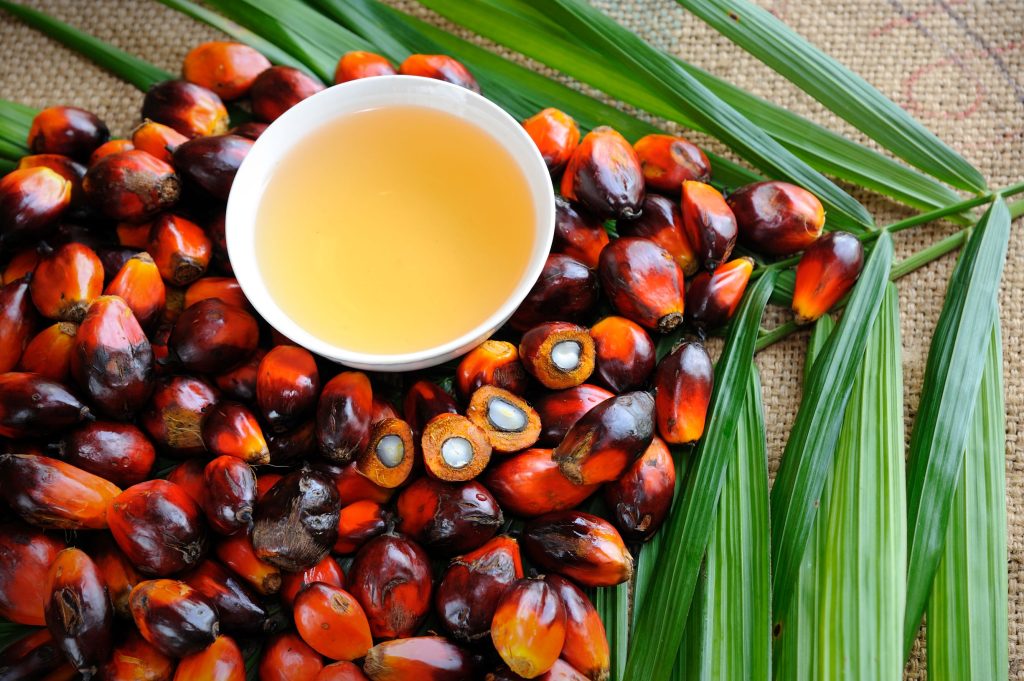
Asia Pacific Exchange (APEX) strengthened its ongoing commitments to promote sustainable production and use of palm oil by being recently certified an Affiliate Member of the Roundtable on Sustainable Palm Oil (RSPO), a global benchmark for sustainable palm oil. Furthermore, effective from APEX October 2020 contracts, all RSPO Growers and Processors will be automatically recognized as the Approved Suppliers under APEX Crude Palm Oil Contract and APEX RBD Palm Olein Contract. In contrast, palm oil producers who are not RSPO certified will be required to apply for approvals before supplying palm oils to APEX palm oil contracts. Overall, this marks a significant milestone for APEX in incorporating sustainability into its production processes for long-term value creation.
Meanwhile, the market has seen an improved performance of the APEX Crude Palm Oil Contract amidst the COVID-19 situation by achieving a historical high Open Interest of more than 25,000 lots recently. Additionally, APEX smoothly completed the physical delivery of more than 15,000 metric tonnes (MT) in the last two delivery months. Since its launch, APEX Crude Palm Oil Contract has successfully facilitated more than 60,000 MT of physical shipments through APEX-cleared Physical Deliveries, Alternative Delivery Procedure (ADP) and Exchange of Futures for Physicals (EFP) arrangements.
In addition, APEX Crude Palm Oil Contract has been proven to have good price discovery functionality during daily trading, demonstrating high price correlations with other related markets: 0.99 with BMD FCPO Contract and 0.97 with DCE Palm Olein Contract. Therefore, more traders are attracted to use APEX CPO Contract as a pricing benchmark and an effective hedging tool for their positions.
Key features of the APEX palm oil contracts
- Calendar Spreads and Inter-commodity Spreads
APEX launched the calendar spread and inter-commodity spread functions on its palm oil products in May 2020 to facilitate the spread trading in the APEX market. Currently, the volume on the spread contracts account for around 40% of the total market volume of APEX CPF Contract.
- Trading Hours covering both BMD and DCE markets
The trading hours of the APEX palm oil contracts are from 9am to 6pm with a 1-hour break from 12:30pm to 1:30pm. Hence, APEX palm oil contracts complement the trading hours of the other two important palm oil contracts in BMD and DCE, enabling more opportunities for hedging and arbitraging.
- Central Counterparty (CCP) for trading and physical delivery
Moreover, being a Central Counterparty (CCP), APEX is able to help international players mitigate their counterparty risks in paper and physical trading, which is especially pertinent now with the higher uncertainty and volatility in the financial markets brought about by COVID-19.
For the latest contract specifications:
APEX Crude Palm Oil Futures Contract
APEX RBD Palm Olein Futures Contract
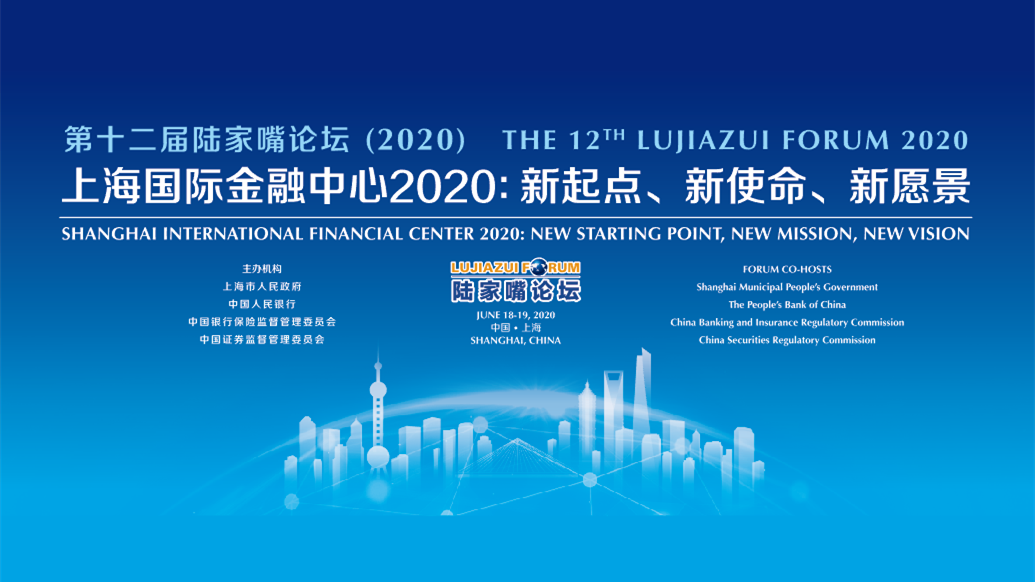
by APEX News | 2020-06-18

China-Singapore Financial Co-operation
Let me first congratulate the Shanghai Municipal Government for successfully convening the Lujiazui Forum while the world is still grappling with the Covid-19 pandemic.
Singapore is honoured to be the Lujiazui Forum’s Partner City this year.
Covid-19 has unleashed not only an economic crisis but also a growing fragmentation of the global economy. This is a threat facing the whole world.
But the countries in Asia are well placed to lead the global economic recovery and forge new channels of cooperation and integration.
Finance can play a key role in facilitating this economic recovery and integration. China and Singapore can help to blaze a new trail in financial cooperation and innovation in Asia.
2020 marks the 30th anniversary of the China-Singapore bilateral relationship. Financial cooperation has been a highlight of this relationship. We have made good progress in three areas.
First, growing the offshore RMB market.
Since 2013, with ICBC being appointed as RMB clearing bank in Singapore, this has helped to promote greater use of RMB in the region.
Singapore is the largest offshore centre for RMB deposits and RMB trade finance and second largest for RMB foreign exchange trading, outside Greater China.
Second, enhancing the links between our capital markets.
The Monetary Authority of Singapore (MAS) and the People’s Bank of China (PBC) are looking to enable designated banks in Singapore to offer custody and trading services for global investors in China’s bond market.
Third, providing opportunities for our financial institutions to grow in each other’s markets.
The Bank of China and ICBC are among the select group of nine Qualifying Full Banks in Singapore; five Chinese banks are licensed as Wholesale Banks.
All three Singapore-headquartered local banks are incorporated in China.
The Shanghai-Singapore Connection
Within this broader canvass of financial co-operation, the ties between Shanghai and Singapore have been intensifying.
Singapore banks are deepening their partnerships in Shanghai –
DBS and Shanghai Pudong Development Bank in loan syndication and joint bond underwriting;
OCBC and Bank of Shanghai in digital banking and supply chain financing;
UOB and Shenergy Group in establishing a consumer finance corporation.
Our exchanges are working closer together.
The Asia Pacific Exchange (APEX), a commodities derivatives exchange in Singapore, is collaborating with the Shanghai International Energy Exchange (INE) to attract more international institutional investors to China’s commodity derivatives markets.
The co-operation between the regulators has been growing stronger.
The Monetary Authority of Singapore (MAS) and the Shanghai Municipal Financial Regulatory Bureau have been organising since 2017 a joint training and exchange programme for financial agencies and institutions from both cities.
MAS and the Shanghai Municipal Financial Regulatory Bureau have also organised since 2015 four editions of the Singapore-Shanghai Financial Forum (SSFF).
MAS will set up a new Shanghai Representative Office in August this year.
The Shanghai Representative Office will be MAS’ second office in China, in addition to its Beijing Representative Office.
This year will also see the launch of the Singapore-Shanghai Comprehensive Cooperation Council Financial Working Group, which will facilitate financial institutions in our two cities to participate in various areas such as cross-border RMB business and product innovation.
Let me suggest one important area where Shanghai and Singapore can work together for the greater good – and that is to harness the power of finance to promote a greener, more sustainable economy.
Using Finance to Green the Economy
The world needs to take urgent actions to reduce the risk of catastrophic climate change. Finance can be a powerful tool to promote a more sustainable economy and society.
Both China and Singapore are committed to meeting their sustainability goals under the Paris Agreement. Both countries have embarked on ambitious green finance agendas.
China issued a Green Industry Guiding Catalogue last year to harmonise differing standards for green activities, and is in the process of updating its taxonomy on green bonds to align with international practices.
Chinese companies led the world with US$33.6 billion of green bond issuance last year.
Singapore launched a Green Finance Action Plan last year, built on three core pillars:
building the financial industry’s resilience against environmental risks;
developing green financial products and solutions; and
leveraging technology to support the development of green finance.
As we stimulate our economies to bounce back from the Covid-19 crisis, there is a good opportunity for Shanghai and Singapore to collaborate on promoting green finance in the region.
There is strong demand in Asia for green investment.
According to a study by the United Nations Environment Programme (UNEP) and DBS Bank, US$200 billion in green investment is required annually until 2030, to support the greening of Asian economies.
We already see Chinese and Singapore banks partnering to finance green and sustainable projects.
In April last year, ICBC Singapore worked with DBS and other global banks to jointly issue its first Belt and Road green bond, sized at US$2.2 billion, and more recently issued its first green loan in Singapore, through a partnership with DBS and OCBC.
In September last year, the Singapore branch of the Agricultural Bank of China collaborated with UOB and BNP Paribas to originate a US$200 million green loan in Singapore.
There is scope for our financial centres to deepen our partnership in green finance.
One, we could create together frameworks for green and sustainability-linked loans customised for Chinese and Singaporean small and medium-sized enterprises (SMEs).
Such frameworks can help promote cross-border syndications in green loans.
They can also help to reduce the borrowing costs of SMEs, which will not need to incur expenses for external reviews certifying their activities are green.
As Vice Premier Liu He said earlier, we must focus on increasing the proportion of SME loans, to promote economic transformation and upgrading.
Two, we could work together to apply innovative FinTech solutions to promote green finance.
The Sustainable Digital Finance Alliance (SDFA) founded by China’s Alibaba Ant Financial and UNEP is a good example. The SDFA has engaged the FinTech community on applying digital technology to promote green finance – such as the digitisation of green bonds.
MAS’ annual Global FinTech Hackcelerator is another platform through which financial institutions and FinTech firms in Shanghai and Singapore can collaborate on innovative green finance solutions.
The Hackcelerator is a global competition that invites market-ready solutions for real problems faced by the financial industry.
This year, green finance is a key theme for the programme, and because of the Covid-19 situation, we are conducting the entire Hackcelerator – from sourcing proposed solutions to curating prototypes – on a cloud-based platform called the API Exchange (APIX).
Through APIX, financial institutions and FinTech firms in Shanghai can engage other players across Asia in collaborative experiments to create digital solutions to support green finance.
I would also like to take this opportunity to invite Shanghai FinTech firms and financial institutions to participate in the Singapore FinTech Festival this November.
Conclusion
There is much that our two financial centres can do together.
Strengthening the partnership between Shanghai and Singapore will bring broader benefits to our economies, and together with other financial centres such as Hong Kong, Tokyo, and Sydney, create a more vibrant financial ecosystem across Asia.
Source: MAS Official Website
https://www.mas.gov.sg/news/speeches/2020/shanghai-and-singapore-financial-centre-partnership
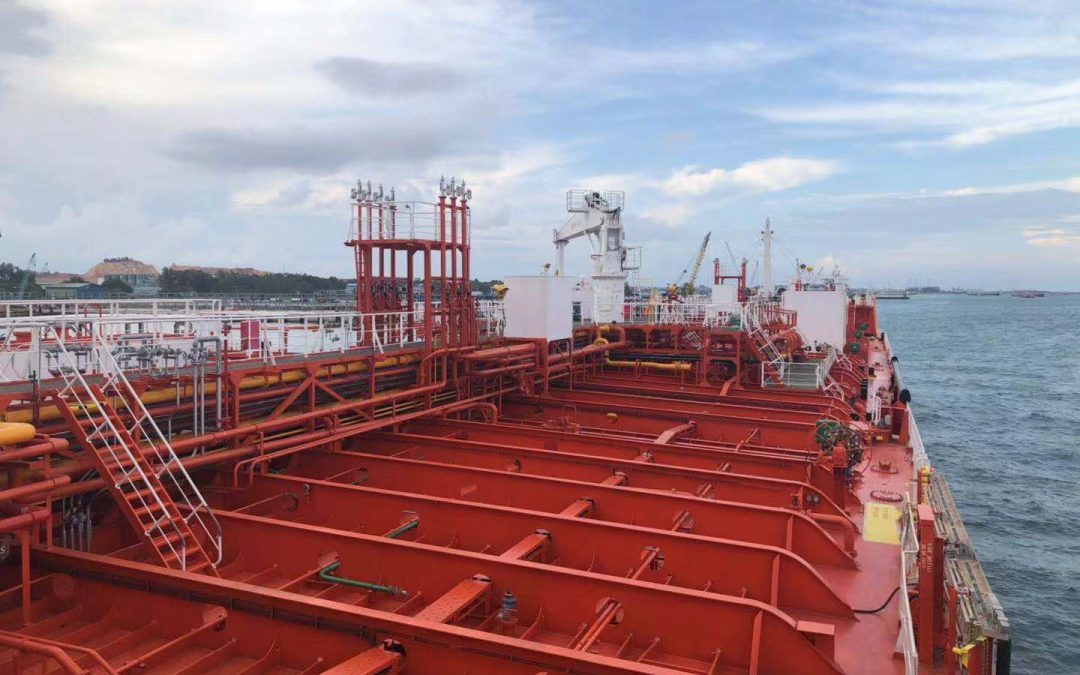
by APEX News | 2019-11-22
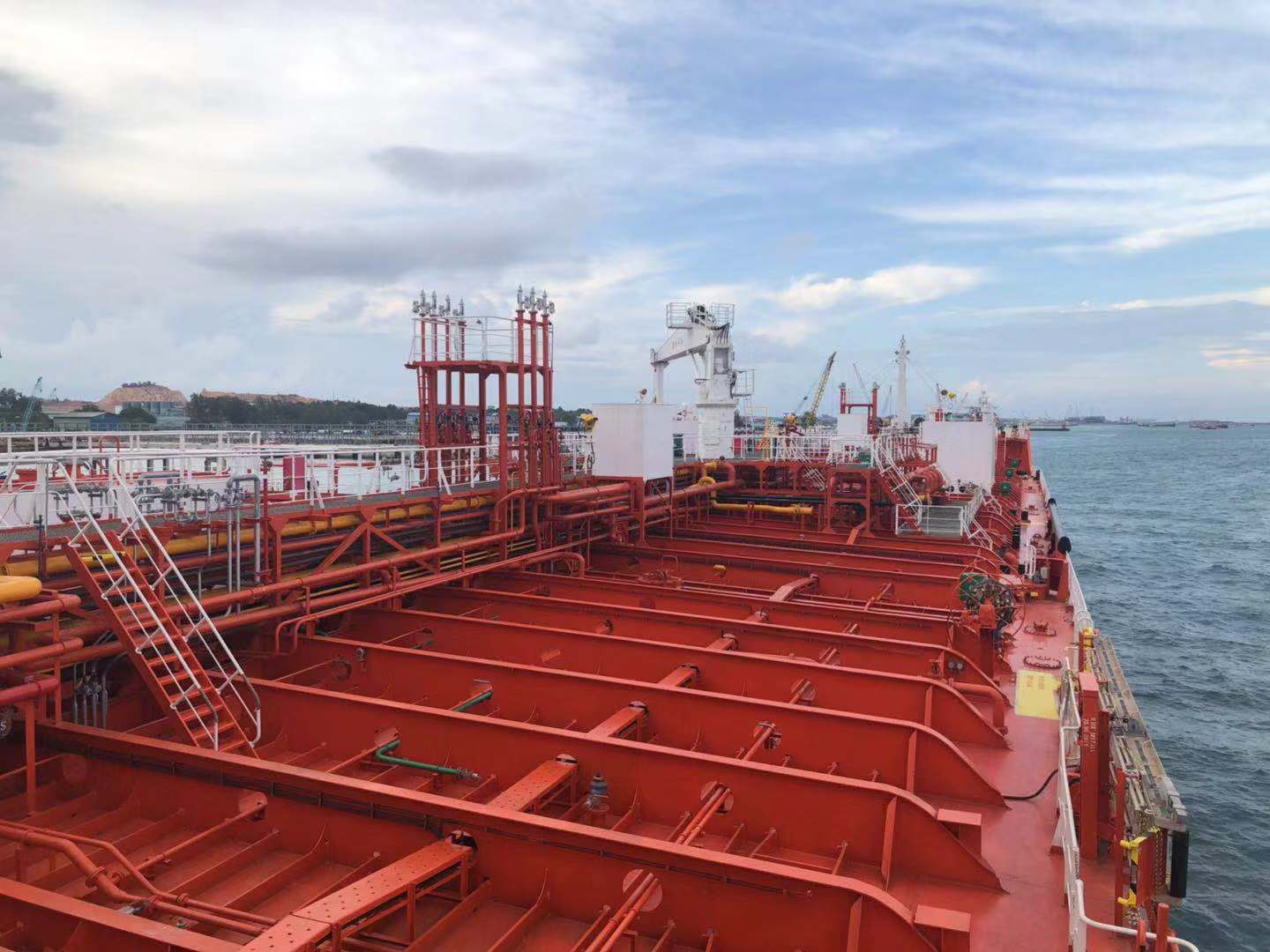
Singapore-based Asia Pacific Exchange (APEX) has completed the second physical delivery of the APEX Crude Palm Oil Futures Contract on 20 Nov 2019, following the successful completion of the first physical delivery in October 2019. 8,000 metric tonnes of crude palm oil were loaded from Batam Port Indonesia, destinated to Haldia Port in India. These successful physical deliveries has proved the reliability and robustness of the physical delivery mechanism of APEX CPO Futures Contract.
15th October 2019 was the last trading day of the CPF1911 Contract and a total of 800 lots (8,000 metric tonnes) of CPO Contracts were qualified for the physical delivery. The nominated port of delivery by the Seller was be Batam Port. The Buyer’s vessel arrived at the port on time and she was berthed in the morning of 19 Nov 2019, loading was commenced right afterwards. Upon completion of the loading one day later, the vessel successfully departed Batam Port after documents clearances, signifying the completion of the delivery process.
One Representative of the Seller commented: “The settings and delivery terms of APEX Crude Palm Oil Futures Contract is simple and practical. It follows closely the practices of international palm oil market in USD pricing and FOB delivery terms, providing to the market an excellent tool for hedging and arbitraging. We are glad to see the steady growth of the contracts with in its Open Interest and Trading Volume.”
The Crude Palm Oil Futures Contract is the second palm-related derivative product launched by APEX. Designed with a Contract size of 10 metric tonnes, US-dollar denomination and FOB delivery terms. Apart from Batam, Indonesia, APEX Crude Palm Oil Futures Contract has five other delivery points: Port Klang and Pasir Gudang in West Malaysia, Lahad Datu in East Malaysia, Dumai and Belawan in Indonesia.
As of 30th October 2019, APEX CPO Contract has an average daily trade volume of 23,000 contracts, and an average daily open interest of 15,000 contracts. The number of market participants continue to increase, with participants coming from palm oil plantation and commercial companies, international trading firms, proprietary/hedge funds and professional money managers.
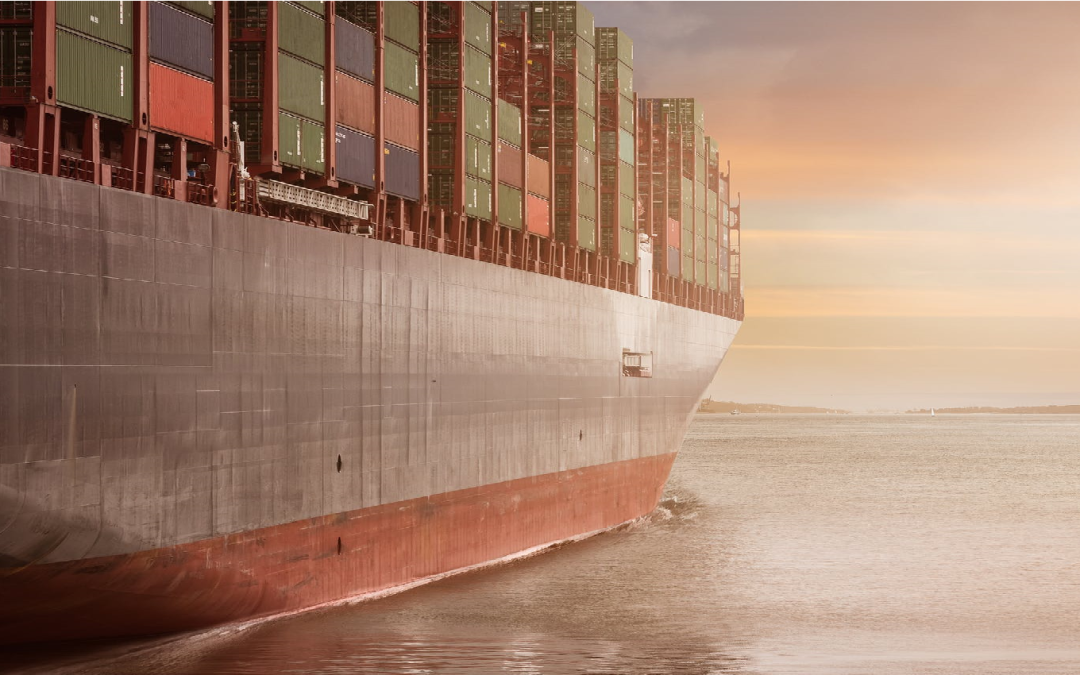
by APEX News | 2019-11-22
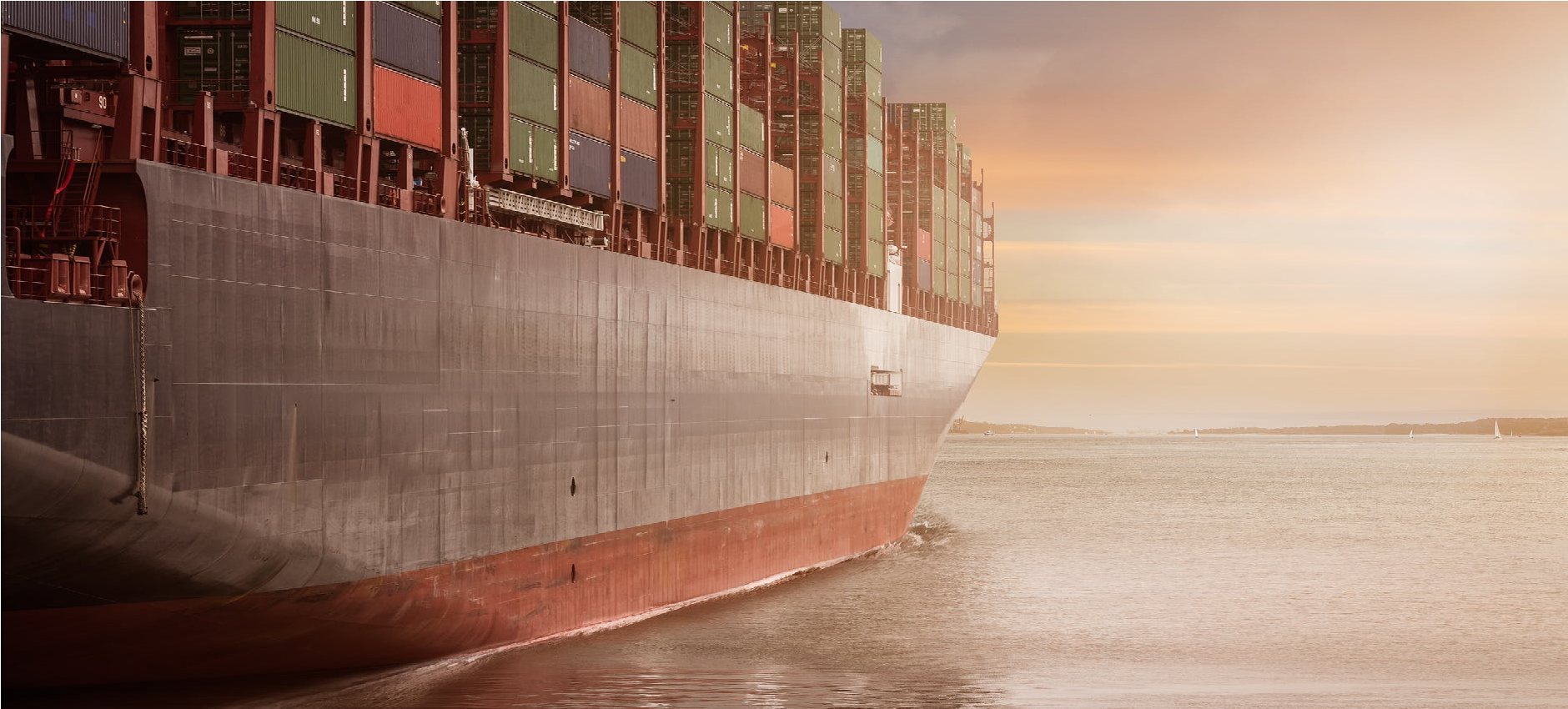
As IMO2020 nears, price volatilities in the fuel oil market have become more pronounced, and in particular, prices for low Sulphur fuel oil have been fluctuating significantly. In order to provide market participants a relevant tool to hedge against these price volatilities, Asia Pacific Exchange (APEX) has launched the Low Sulphur Fuel Oil Futures Contract (LFO Contract) at 9pm on 21st Nov 2019. The LFO Contract is the first deliverable product worldwide to facilitate hedging and FOB physical delivery of low Sulphur fuel oil. The first contract month is the Jan-20 contract, and a total of 12 consecutive monthly contracts were listed.
When IMO2020 take effect in January 2020, ships that fail to install scrubbers are required to use low Sulphur bunker fuel containing not more than 0.5% Sulphur. Given the uncertainties surrounding the demand and supply of the fuel, price volatilities for low Sulphur fuel oil is expected to increase further. The LFO Contract will provide market participants an instrument to manage such price risk. In addition, traders may use the contract for spread trading against crude oil and other refined oil markets.
In terms of delivery, participants may choose from an array of delivery methods. The fuel may be FOB delivered in to a vessel or barge, or received by inter-tank transfer into a nominated tank. These deliveries shall take place at specified warehouses located in Singapore, Malaysia and Indonesia along the Straits of Malacca and Straits of Singapore. For a fuel to be eligible to be delivered, it needs to be sourced from suppliers approved by APEX. These suppliers are approved based on various criteria, including the demonstration of a positive track record of supplying compliant fuel. In order to affirm its quality, any fuel to be delivered has to be inspected by a surveyor before loading.
Besides the LFO Contract, APEX have listed a physically deliverable High Sulphur Fuel Oil Futures (FO Contract) on 11th Apr 2019. So far, the daily average trading volume for the FO Contract is around 20,000 lots (200,000 MT), and its daily average open interest is around 3,600 lots (36,000MT). In addition, following a collaboration with Argus Media, APEX have also launched the cash-settled ABI Singapore Low Sulphur Fuel Oil Futures (LFA Contract) on 18th Oct 2019. The LFA Contract will settle against a ‘delivered to ship’ low Sulphur fuel oil price index assessed by Argus.
As IMO2020 nears, price volatilities in the fuel oil market have become more pronounced, and in particular, prices for low Sulphur fuel oil have been fluctuating significantly. In order to provide market participants a relevant tool to hedge against these price volatilities, Asia Pacific Exchange (APEX) has launched the Low Sulphur Fuel Oil Futures Contract (LFO Contract) at 9pm on 21st Nov 2019. The LFO Contract is the first deliverable product worldwide to facilitate hedging and FOB physical delivery of low Sulphur fuel oil. The first contract month is the Jan-20 contract, and a total of 12 consecutive monthly contracts were listed.
When IMO2020 take effect in January 2020, ships that fail to install scrubbers are required to use low Sulphur bunker fuel containing not more than 0.5% Sulphur. Given the uncertainties surrounding the demand and supply of the fuel, price volatilities for low Sulphur fuel oil is expected to increase further. The LFO Contract will provide market participants an instrument to manage such price risk. In addition, traders may use the contract for spread trading against crude oil and other refined oil markets.
In terms of delivery, participants may choose from an array of delivery methods. The fuel may be FOB delivered in to a vessel or barge, or received by inter-tank transfer into a nominated tank. These deliveries shall take place at specified warehouses located in Singapore, Malaysia and Indonesia along the Straits of Malacca and Straits of Singapore. For a fuel to be eligible to be delivered, it needs to be sourced from suppliers approved by APEX. These suppliers are approved based on various criteria, including the demonstration of a positive track record of supplying compliant fuel. In order to affirm its quality, any fuel to be delivered has to be inspected by a surveyor before loading.
Besides the LFO Contract, APEX have listed a physically deliverable High Sulphur Fuel Oil Futures (FO Contract) on 11th Apr 2019. So far, the daily average trading volume for the FO Contract is around 20,000 lots (200,000 MT), and its daily average open interest is around 3,600 lots (36,000MT). In addition, following a collaboration with Argus Media, APEX have also launched the cash-settled ABI Singapore Low Sulphur Fuel Oil Futures (LFA Contract) on 18th Oct 2019. The LFA Contract will settle against a ‘delivered to ship’ low Sulphur fuel oil price index assessed by Argus.
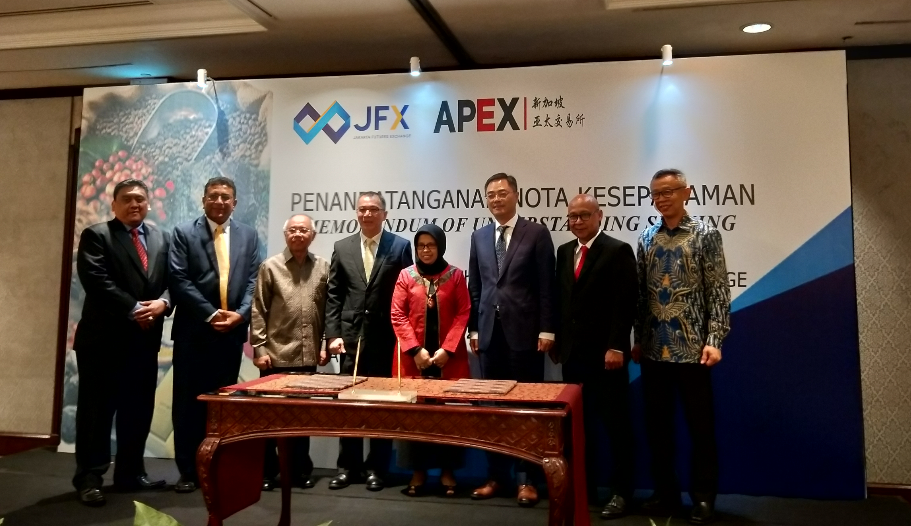
by APEX News | 2019-11-18

Jakarta, 18 November 2019 – Today, Jakarta Futures Exchange (JFX), the first derivatives exchange licensed by Commodity Futures Trading Regulatory Agency in Indonesia, announced a Memorandum of Understanding (MOU) with Asia Pacific Exchange (APEX), an international derivatives exchange approved by the Monetary Authority of Singapore, the third exchange with the Approved Exchange” and “Approved Clearing House” licenses in Singapore.
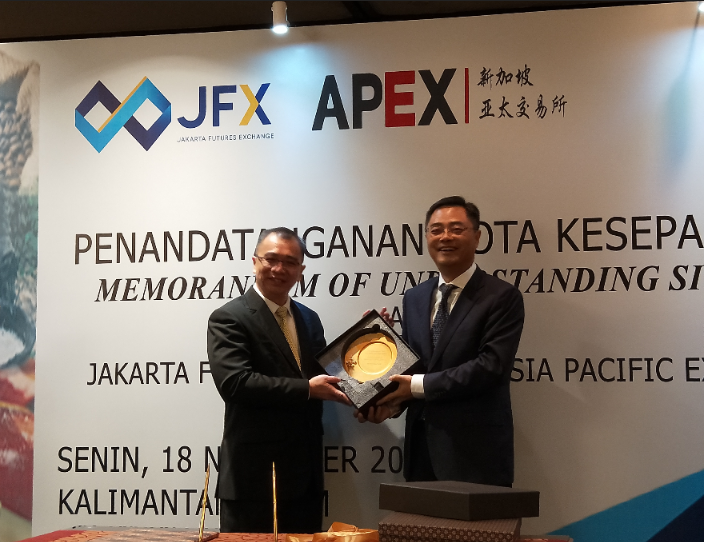
JFX has been in the derivatives industry in Indonesia for 19 years, having conducted its first trading in December 2000. The exchange currently has 80 members, with 19 derivative contracts currently listed on its board. It also runs 2 physical commodity exchanges whose prices serve as a benchmark for Indonesian government when setting reference price for the respective commodities. JFX has been in the forefront of technology and is currently undergoing fourth upgrade to its matching engine.
APEX commenced operations in May 2018 and currently has 5 contracts. The most active contract is the Crude Palm Oil Futures Contract, which was launched on 18th April 2019. During its first seven months of trading, the contract has seen its open interest grow steadily, reaching close to 15,000 contracts with an average daily volume around 23,000 contracts. It has seen its first physical delivery taking place from Indonesia in October, where 7,000 metric tonnes of crude palm oil were loaded from Batam Port and destinated to India.
The information sharing MOU between JFX and APEX will serve as a starting point for JFX to garner interests from international participants to trade in JFX’s contracts and vice-versa. It will be a fruitful cooperation for both JFX and APEX.
Stephanus Paulus Lumintang, President Director, Jakarta Futures Exchange, comments: “JFX is committed to providing its members with the best solutions and services in the derivatives industry. We hope that our cooperation with APEX can be used optimally by our members and, in turn, delivers benefits to the futures trading community in Indonesia.”
Eugene Zhu Yuchen, Chief Executive Officer, Asia Pacific Exchange, comments: “APEX is very honoured to partner with JFX and bring the futures trading industry in Indonesia to its next stage of development. We are committed to provide our time and resources so as to achieve mutual benefit between the two exchanges in terms of information and knowledge sharing. APEX looks forward to this partnership as well as more opportunities to work together in the future.”






